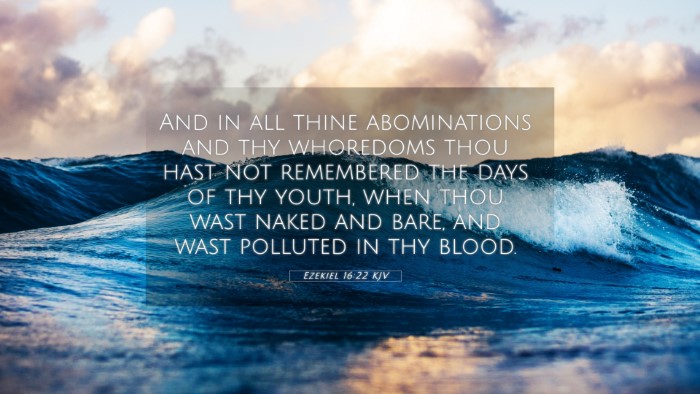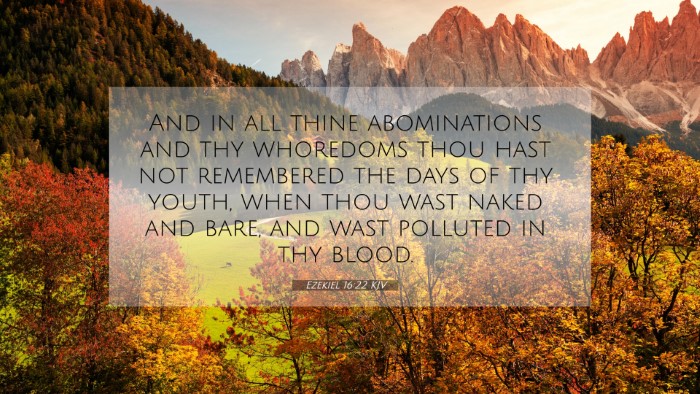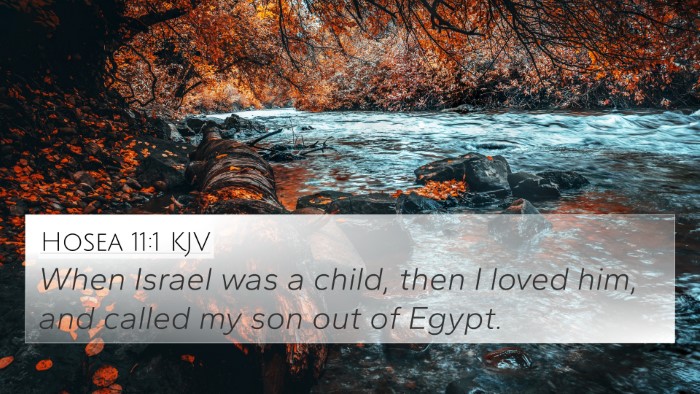Ezekiel 16:22 - Meaning and Interpretation
Ezekiel 16:22 states: "And in all thine abominations and thy whoredoms thou hast not remembered the days of thy youth, when thou wast naked and wast spoiled, and wast polluted in thy blood." This verse encapsulates a profound message regarding spiritual unfaithfulness and the importance of remembering one's beginnings.
This verse highlights the concept of forgetting one's roots and the implications of neglecting one's covenant with God. The imagery used conveys a sense of betrayal, as Israel, represented as an unfaithful bride, disregards the grace and care shown to her by God.
Insights from Public Domain Commentaries
Matthew Henry's Commentary
According to Matthew Henry, this verse emphasizes God's lamentation over Israel’s spiritual whoredom. The heart of the message indicates a severe negligence on the part of Israel to remember their past condition, which was vulnerable and needy. Henry argues that this historical reflection is crucial for recognizing divine grace.
Albert Barnes' Notes
Albert Barnes expands on this notion by connecting the abominations with a spiritual corruption that is indicative of a covenant broken. He notes that remembering the "days of thy youth" serves as a poignant reminder of the state of grace from which Israel had fallen. Barnes emphasizes that remembrance can lead to repentance and restoration.
Adam Clarke's Commentary
Adam Clarke interprets this verse through the lens of Israel’s ingratitude and the consequences of their actions. He underlines that the forgetfulness of one’s prior state, particularly the acknowledgement of God’s mercy during their captivity, indicates a deep spiritual decline. Clarke encourages a reflective understanding of one's past as a means of recognizing and appreciating God's unwavering support.
Cross-References and Thematic Connections
This verse can be linked to several important biblical themes and verses:
- Deuteronomy 15:15 - Remembrance of being a servant in Egypt and the resultant charity.
- Jeremiah 2:32 - A similar rebuke about forgetting the love of youth.
- Hosea 2:5 - The metaphor of unfaithfulness used to describe Israel’s spiritual infidelity.
- Isaiah 51:1 - A call to look back to the rock from which they were hewn, prompting reflection.
- Romans 9:25-26 - Paul echoes the theme of God’s people and their past identity.
- 1 Corinthians 10:12 - A warning against prideful forgetfulness leading to downfall.
- Revelation 2:5 - A call to remember where one has fallen and to repent.
Understanding the Significance of the Verse
The significance of Ezekiel 16:22 lies in its capacity to engage the reader in a self-reflective process about their own spiritual state. The call to remember indicates a need for introspection that is echoed across scripture.
Thematic Connections and Interpretations
The themes present in this verse resonate throughout the Bible, creating an inter-Biblical dialogue that underscores the importance of remembering one's covenant relationship with God. These theological themes can serve as tools for Bible cross-referencing and offer a deeper understanding of similar messages found in various scriptures.
Tools for Bible Cross-Referencing
Utilizing a Bible concordance or a Bible cross-reference guide can assist readers in identifying crucial connections between verses. Learning how to use Bible cross-references effectively can greatly enhance one's study and understanding of scriptural themes.
Final Reflections
In closing, Ezekiel 16:22 serves as a potent reminder of the dangers of spiritual forgetfulness and the importance of reflection upon God's past mercies. By examining the connections between this verse and others through comparative Bible verse analysis, we can gain deeper insights into the nature of God’s relationship with His people. This reflective study can aid in sermon preparation and personal edification.








